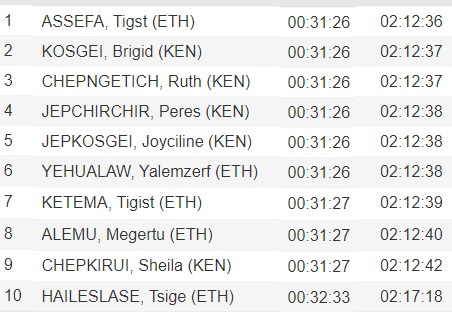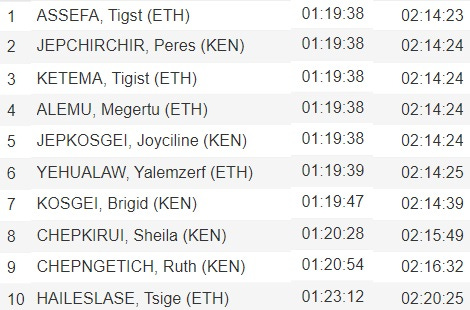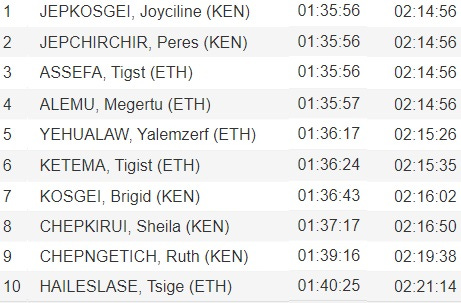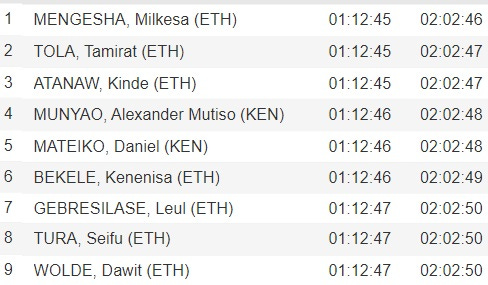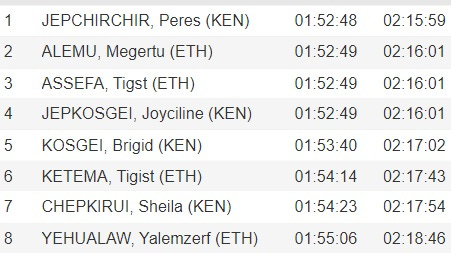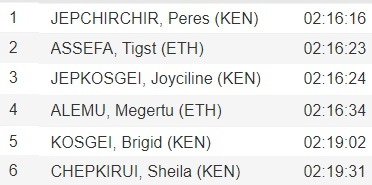The 2024 London Marathon is here, prompting wild yet compelling guesses about the outcome based on the shakiest of ironclad reasoning
Blane climate change for any inaccuracies
It’s unlikely many of my readers will be awake when this hits their inboxes, and most will probably still be snoozing when the top finishers of the 2024 London Marathon have completed the course. The elite women will (or did) set off at 9:25 a.m. and the elite men at 10:00 a.m. Those times correspond to 2:25 a.m. and 3:00 a.m. in the American Rockies, where I am now, and 4:25 a.m. and 5:00 a.m. on the U.S. East Coast, where I have still spent most of my life and the habitat of most regular Beck of the Pack readers inclined to follow things like marathon races in real time.
I plan to stay awake for the whole thing despite lacking access to the video or the willingness to invoke a VPN, since I don’t mind absorbing a few Larry Bird trash-talk highlight reels between getting the split times of the leaders at the usual checkpoints from the race leaderboard.
If I do stay awake, I will update this post at my leisure and hence sporadically, with as much adherence to internationally accepted standards of respectful hecklership as I can muster. The reason I’m bothering at all is that I expect the men’s and women’s races to produce top-five results of similar quality despite the women’s field being overwhelmingly superior on paper.
As a World Athletics preview of the London action notes, the women’s race features a match-up between the current world-record-holder, Tigist Assefa of Ethiopia, and the woman whose 2019 record Assefa broke last year in Berlin, Brigid Kosgei of Kenya. But dwarfing this match-up is the sheer glut of distaff long-distance talent assembled in London today, with nine of history’s fastest nineteen women over 42.195K on record-eligible courses expected to start the race.
For the men’s field to be of the same unlikely caliber, it would have to boast the current world-record holder and eight additional athletes with personal bests no slower than 2:03:24, the current #19 all-time performance. As is evident from the above rosters, that didn’t happen, and Kenenisa Bekele’s 2:01:41 is five years old, which wouldn’t be a glaring problem if not for being thirty-six years younger than Bekele himself. Bekele will be lucky to run 2:07-2:08 and will more likely retire from the race near 27.7 kilometers.
The women’s race is being billed as an attempt on the women’s-only world record, in which setting no male pacemakers are allowed. But that record is “only” 2:17:01, set in London seven years ago by Mary Keitany. It’s hard to imagine these women holding themselves back to 3:15 per klick or 5:13-ish per mile, especially with Assefa barking out of her ass about being capable of breaking 2:10:00. Also, today’s world-class women marathoners are notorious for both reckless pacing and avoiding being consistently punished for such extravagance, often setting or approaching personal, national, and even world records while pacing themselves foolishly.
I think that the spectacular depth up front of the women’s field will be its downfall, as at least four women will ignore their female pacers and rip through the halfway point in under 1:06, with the rest of the elite women not far behind but mostly alone by then. I expect the top two women’s times to be around 2:15 and 2:16, with no one else under 2:18:00.
No one in the men’s race is close to a favorite on paper. Some wiseacre might decide to go through halfway in under 1:01, but if so, he’s unlikely to have any takers. If the members of the pack play it cool, a couple of them might set personal bests. In fact, the men’s winner will probably flirt with a sub-2:03:00, and 2-3-4 should all be under 2:04:00 as well.
If these guesses prove accurate, the top five men’s times and the top five women’s times will rate about the same. And they’re a lot more granular than my “predictions” for last Monday’s Boston Marathon, which were really more like unheard orders to the men’s and women’s fields. I was pleased to see that Sisay Lemma did in fact try an early break from the field at a reckless or at least reck-shy pace, hitting halfway in exactly the slowest time I declared tolerable to serious fans (1:00:19) and putting to rest the idea that early Boston breakaways invariably fail by holding on for the win.
Anyway, the women are scheduled to get started in just over half an hour. Check in to see how smug I am about being correct, humiliated I am at being wrong, or both, depending on how many stimulant and psychotropic drugs I ingest throughout the proceedings.
Women at 5K: If they’re running this fast, someone is intent on breaking the world record and at least a few of the nine leaders will accelerate over the next 5K.
Were the marathon being scored like a cross-country meet, Kenya would hold a 22-33 lead over Ethiopia. Kenya is also far ahead of Ethiopia when it comes to athlete doping bans both expired and extant.
Women at 10K: 15:44-15:42 counts as accelerating, albeit almost undetectably. But nine women being on 2:12-and-change pace a quarter of the way through a marathon when only one woman in history has broken 2:14:00 is a wonder on its own, promising ample carnage and thunderously shattered dreams on London’s pavement within the hour.
Women at 15K: The world-record effort, if there ever was one today, seems to have stalled after a 16:11 split. But all nine of the early leaders are still close together, although Sheila Chepkurui seems to be yielding a few strides. Not good. Just not good at all.
The winning women’s time at last month’s 2024 U.S. 15K Road Championships in Jacksonville, Florida was 48:26.
Men at 5K: “The men’s winner will probably flirt with a sub-2:03:00” looks like a great guess with only 23.1 miles of running remaining.
Men at 10K: A 14:28-14:29 5K split by the entire leading dozen pushed the projected finish time down to 2:02:36, a time only five men have bettered.
Women at halfway: Despite the pace lagging marginally over the past 6.1K, two of the nine lead women have fallen substantially in arrears. I think that most these gals’ ambitions are proving larger than their aerobic capacities, but that anyone who can burp out a 1:07 half not even breathing that hard deserves heartfelt praise for showing up and making this event even more special than the last.
Men at 15K: All dozen of the leaders are still on sub-2:03:00 pace. Their split, however, was considerably slower than the winning men’s time at the U.S. 15K Champs in Jacksonville.
Women at 25K: Brigid Kosgei if OFF the BACK, winnowing the lead pack to six bodies. All of this is forcing me to consider the paucity of people I can think of with the initials Y.Y.
Last 10K for the leaders: 32:01 (5:09 per mile).
Men at halfway: Bekele running a 1:01:30 half at age 41 is solid on its own. I still think he’ll be toast shortly. Lead pack down to ten.
Women at 30K: A 16:18 split (5:15 pace) sufficient to drop two of the six leaders spells doom for all but maybe two of these athletes. I’m glad I can’t actually see any of the race video because I’d be getting emotional by this stage.
Men at 25K: The pace has eased down incrementally, costing the pack a runner and reducing the number of fellows on pace for 2:02:50 or better to a mere nine—the same as the number of sub-2:03:00 runners on the all-time list.
Women at 35K: The four leaders ran 5:25 pace over the last 5K and still extended their gap on everyone else to over a minute. Remember, the race starts at 20 miles.
Men at 30K: This is the point where the marathon race really starts for well-trained athletes. The pack seems to be dispersing, as all mobs inevitably do, in this case under the lash of Tamirat Tola’s 14:35 split.
Women at 40K and the finish line: With 2.2K to go, the same four women are still together, having picked up the pace slightly to 5:17 per mile over the past 5K to reach 24.86 miles in 2:09:13.
Peres Jepchirchir powers through the final 2.2K at 5:10 pace to win by seven seconds over the world-record holder.
Men at 35K: Kenenisa Bekele is now co-leading the race by four seconds with Alexander Munyao after a 14:47 5K split. He’s less and less likely to drop out the longer he continues to extend his lead over others.
Men at 40K and the finish line: Despite slowing to 15:02 over the last 5K, Munyao put six seconds on Bekele, with the leader now on pace for a finish of over 2:03:30. Incredibly, these two are now over two and a half minutes up on third place.
Unlike the women, the men are mustering no late-race surges of pace. Munyao holds on for the win despite running 6:51 for the last 2.2K, five minutes per mile on the nose.
Bekele’s time age-grades to something preposterous no matter what resource one consults. Howard Grubb’s calculator equates a 2:04:15 for a 41-year-old man to two hours flat for an open-category male-identifying athlete, while RunBundle suggests that a crisp 1:59:34 is a better bet, the latter being up-to-date on what the world record for 41-year-olds is or very recently was.
It appears that the women’s race was the better race overall, not just because four women were still in the hunt with a mile to go but based on the top five finishers’ relative performances. In fact, it wasn’t even close, even if the women’s race may not have lived up to its necessarily obscene billing.





